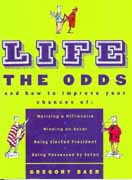
Life: The Odds
Chance, Coincidence, Luck Contune to Fascinate Players
Throughout history (and perhaps even more today), chance, coincidence and luck have fascinated both professional and recreational gamblers. Perhaps it’s because throughout history winning and Howard Schwartz, the "librarian for gamblers," is the marketing director for Gambler's Book Club in Las Vegas, a position he has held since 1979. Author of hundreds of articles on gambling, his weekly book reviews appear in numerous publications throughout the gaming industry. Howard's website is www.gamblersbook.com losing battles, fortunes and “saving face” in the midst of intense decision-making have left an indelible mark in our minds—our psyche, our level of self-esteem, even, in some cultures, on occasion, with religious overtones.
Howard Schwartz, the "librarian for gamblers," is the marketing director for Gambler's Book Club in Las Vegas, a position he has held since 1979. Author of hundreds of articles on gambling, his weekly book reviews appear in numerous publications throughout the gaming industry. Howard's website is www.gamblersbook.com losing battles, fortunes and “saving face” in the midst of intense decision-making have left an indelible mark in our minds—our psyche, our level of self-esteem, even, in some cultures, on occasion, with religious overtones.
Sure we sometimes hate to admit it but we all have “hunches” or beliefs that we’re “due” to win or that a certain number will occur at a racetrack or casino or in a lottery. Perhaps that’s what dreams are made of: the ability to dream, to control our destiny, to escape from reality.
In recent months, a group of new titles that analyze the phenomenon of luck and coincidence have hit the bookshelves--partially because gambling is a hot topic and because gambling and probability are interlinked in a generation often obsessed with “action” and the hopes of hitting it big—to be blessed with sudden riches.
The following books, with a thumbnail description, are listed to help those who wonder if they will be gifted with the “magic of good luck” understand themselves and these concepts of chance and coincidence.
Beyond Coincidence by Martin Plimmer and Brian King (277 pages, hardbound, $23.95). Here’s a marvelous collection of incidents, many involving gambling (repeat lottery winners, superstitions and patterns of crap shooters) attitudes and psychological studies of people who “feel lucky” and incidents throughout history which fall into the “believe it or not” category.
The Age of Chance by Gerda Reith (207 pages, paperbound, $38.95). Although a paperbound with a heavy price, it’s one focused with heavy academic research. For both players and the house, it does a fine job of explaining why people gamble and have continued to gamble throughout history. It discusses the origins of chance; chance and determinism; the birth of probability; chance and the suspension of reality; how the games evolved from the 19th Century to modern times. This is a fine resource too for clinical psychologists treating problem gamblers.
Struck By Lightning by Jeffrey Rosenthal (264 pages, paperbound, $24.95). This is both a probability guide and an examination of randomness, including the concept of mathematical reasoning. Two major sections examine poker, blackjack and bridge and why the casinos always win in the long run. Other sections discuss causes of randomness; how to make decisions; coincidence and surprise and how probability affects our every day lives including the political arena.
Life—The Odds by Gregory Baer (252, paperbound, $11). A dandy little pocket guide which may make you a “maven” at the next cocktail party or family gathering, this one has lots you might want to know (or not), such as your chance of catching a ball at a major league baseball game; surviving a train crash; getting away with murder; making a hole in one; bowling a perfect game; succeeding in a variety of small businesses; sharing a birthday; winning a various casino games and being audited by the IRS. It’s light reading, packed with fascinating trivia in a variety of areas. Not for the true worrier.
